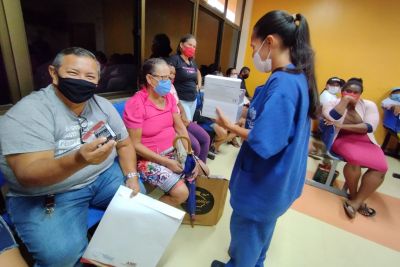Outreach procedures, with lectures and condom distribution, are carried out for users in the ambulatory reception
by the Government of Pará (SECOM)
12/19/2022 6:17 PM
The General Hospital of Thailand (HGT), in Southeast Para, has joined the national campaign “Red December”, which alerts residents to the importance of preventing and controlling HIV/AIDS and other sexually transmitted diseases. The campaign promotes prevention, assistance and protection of the rights of people affected by sexually transmitted diseases. Until the end of the month, the Humanization Working Group (GTH) of the unit is implementing health education actions targeting users.
Following the principle of integration of care and management of the National Humane Policy, HGT has already conducted lectures in the outpatient reception, delivered by Nursing Technician Luciene Dias, in addition to distributing condoms and informational materials.

Among the users who attended the lecture was Regiane Silva, 40, who “is getting sick nowadays. The more people adopt prevention, the better for public health. Little did I know that December was Dedicated to awareness, but this campaign is necessary. I am a mother and I talk about the issue with my child. Is it urgent. I see several cases in daily life.”
protection – The nursing technician highlighted some measures to prevent STIs, including the use of condoms; vaccination against hepatitis A (HAV), hepatitis B (HBV) and HPV (human papillomavirus); a discussion with the partner about testing for HIV and other STDs; Regular testing for HIV and other sexually transmitted diseases and preventive screening for cervical cancer (colon oncology).
“Sexually transmitted diseases, although they have been known since the beginning of time and currently have effective treatment, in most cases they are still important causes of disease. There are sexually transmitted infections that cause symptoms and changes mostly in the genitals ( such as warts, vaginal and/or urethral secretions, and wounds on the genitals) to AIDS and viral hepatitis, which can cause conditions that do not cause changes in the genital organs, but can seriously harm, leading to a risk of death for people affected by them. Knowledgeable infectious scientist Marcio Ochoa.
The doctor also explained that the public health network has diagnostic and treatment resources that allow for appropriate treatment. A person only needs to go to health services, especially to the Test and Counseling Centers (CTA), which are units that specialize in the integrated treatment of these diseases. “As a prevention, the most important thing is the usual measures of personal hygiene, limiting the number of sexual partners and, above all, the treatment of patients and the use of condoms in all sexual relations,” directs Marcio Ochoa.
The Unified Health System (SUS) provides the population with the most advanced strategies and technologies for preventing HIV infection, such as pre-exposure prophylaxis (PrEP) and post-exposure prophylaxis (PEP), as well as expanding access to early diagnosis and specific actions for groups most at risk of HIV infection, such as Transgender people, homosexual men, sex workers, persons deprived of liberty, and abusers of alcohol and other substances.
national data – According to the Department of Diseases, Chronic Conditions and Sexually Transmitted Diseases of the Ministry of Health, in 2020 there were about 920,000 people living with HIV in Brazil, of which 89% were diagnosed, 77% were treated with antiretrovirals (medications) and 94% of those who Are receiving treatment have not transmitted HIV sexually because they have reached an undetectable (non-transmissible) viral load. In Brazil, 41,919 new cases of HIV were diagnosed in 2019 and 37,308 cases of AIDS.
The highest incidence of AIDS is found among young people between the ages of 25 and 39 of both sexes, with 492,800 records recorded. Cases in this age group correspond to 52.4% of cases among men and 48.4% among women.
The HGT has 51 beds and maintains an intensive care unit (ICU) with nine beds, six for adults and three for children. Users of the Unified Health System (SUS) can access the services provided by the HGT through the Municipal Regulation Center, and urgent and emergency cases are processed on demand or forwarded by Samu, the Military Fire Department and the Highway Police.
service: HGT is a health unit of the Government of Para, run by the National Institute of Social and Human Development (INDSH), in partnership with the State Department of Public Health (Sespa). It is located on Avenida Florianópolis, Bairro-Novo. More information by phone (91) 3752-3121.
Text: Pedro Amorim – Ascom/HGT

“Wannabe internet buff. Future teen idol. Hardcore zombie guru. Gamer. Avid creator. Entrepreneur. Bacon ninja.”



